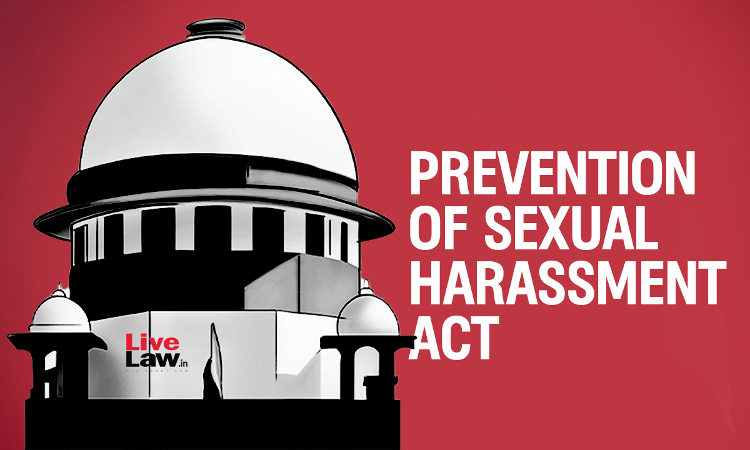- Home
- /
- Top Stories
- /
- Supreme Court Issues Notice To...
Supreme Court Issues Notice To Union & BCI On Plea To Bring Bar Councils Under POSH Act For Women Advocates
Amisha Shrivastava
29 Aug 2025 2:00 PM IST
A PIL has been filed in the Supreme Court seeking declaration that the protections under the Sexual Harassment of Women at Workplace (Prevention, Prohibition and Redressal) Act, 2013 extend to women advocates who are registered with State Bar Councils and practicing before courts.The petition also seeks directions to Bar Councils and Bar Associations to constitute Internal Committees to hear...
A PIL has been filed in the Supreme Court seeking declaration that the protections under the Sexual Harassment of Women at Workplace (Prevention, Prohibition and Redressal) Act, 2013 extend to women advocates who are registered with State Bar Councils and practicing before courts.
The petition also seeks directions to Bar Councils and Bar Associations to constitute Internal Committees to hear the complaints of women advocates.
“The Preamble to the POSH Act itself states that sexual harassment violates a woman's fundamental rights to equality under Articles 14 and 15, life and dignity under Article 21, and freedom to practice any profession under Article 19(1)(g), which includes the right to a safe environment free from sexual harassment. The very object and design of the statute is to give effect to these rights, and any interpretation that excludes women advocates from its protection is contrary to the constitutional purpose that the Act seeks to fulfil”, the petition states.
A bench of Justice BV Nagarathna and Justice R Mahadevan today issued notice to the Union of India and the Bar Council of India in the petition filed by advocate Seema Joshi, author of Breaking the Silence: A Handbook on the POSH Act and a member of the Internal Committee of the National Legal Services Authority (NALSA).
The petition also seeks to set aside the Bombay High Court's July 7, 2025 judgment in UNS Women Legal Association (Regd.) v. Bar Council of India & Ors. to the extent it confines the POSH Act to employees of Bar Councils and Bar Associations.
The petition states that the judgment wrongly excluded women advocates from the ambit of the Act by adopting a restrictive interpretation. It has been contended in the petition that the POSH Act is intended to cover “any woman” present in a workplace, whether employed or not.
As interim relief, the plea seeks a stay of the High Court judgment and for all Internal Committees constituted by Bar Councils, Bar Associations and similar institutions to continue to entertain complaints by women advocates.
During the hearing today, Justice Nagarathna questioned how a petition under Article 32 of the Constitution could be filed against a High Court judgment.
“Either you file a PIL under Article 32, or you challenge the Bombay High Court order as an SLP. You cannot file a writ petition challenging the High Court order. If you are wanting to achieve something, do it properly”, Justice Nagarathna said.
In response, advocate Ritika Vohra for the petitioner agreed to not press the prayer seeking to set aside the HC judgment and the interim prayer for a stay. She also agreed to delete the Bar Council of Maharashtra and Goa and the State of Maharashtra as respondents.
The petition cites Section 2(a) of the Act, which defines an “aggrieved woman” as one “whether employed or not”, and Section 3, which prohibits sexual harassment against “any woman” at the workplace.
The petition relies on Section 2(o)(i) to contend that courts, Bar Council offices and Bar Associations are “institutions” or “establishments” and fall under the ambit of “workplace” within the Act.
It argues that Bar Councils are statutory bodies under the Advocates Act, 1961, and that Bar Associations operate within court premises supported by State infrastructure; therefore, under Section 4, each must constitute an Internal Committee competent to receive complaints from women advocates.
It further points to the Supreme Court's binding directions in Medha Kotwal Lele v. Union of India, where Bar Councils and Bar Associations were directed to establish redressal mechanisms for sexual harassment complaints from women advocates. The petition claims the Bombay High Court's ruling is per incuriam for failing to consider these directions.
“the Hon'ble High Court's Judgement dated 7.7.2025 has the immediate and deleterious effect of excluding an entire class of women professionals—namely, women advocates—from the statutory protection and redressal mechanisms envisaged by the POSH Act, despite the plain language of the statute, its expansive definitions, the binding directions of this Hon'ble Court in Medha Kotwal Lele v. Union of India (2013) 1 SCC 297, and the consistent institutional practice of treating courts, Bar Councils, and Bar Associations as 'workplaces' within the meaning of the POSH Act”, the petition states.
The petition further points to Internal Committees already set up by the Bar Council of Delhi and the Delhi High Court Bar Association to receive complaints from women advocates, the Delhi High Court's framework recognising that complainants and respondents in court settings may include lawyers and litigants, and the Supreme Court's 2013 Regulations extending protection to “any female, of any age, whether employed or not” within the Supreme Court precincts. It contends that the High Court judgment undermines this institutional practice and creates a statutory vacuum.
The petition prays that the Supreme Court should exercise its extraordinary power under Article 142 to ensure a purposive application of POSH to women advocates.
Advocates Ritika Vohra (Advocate-on-Record), Amber Tickoo, and Naman Joshi represented the petitioner.
Case no. – W.P. (C) No. 805 of 2025
Case Title – Seema Joshi v. Bar Council of India and Ors.



